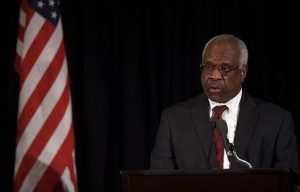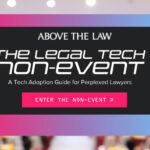
Harlan Crow’s Lawyers Tell Senate They’re Going To Take Their Chances With Contempt

(AP Photo/Susan Walsh, Pool)
Clarence Thomas BFF #1 Harlan Crow engaged Michael D. Bopp of Gibson Dunn to inform the Senate Judiciary Committee that he won’t be cooperating with its inquiry into the hundreds of thousands of dollars worth of gifts, free tuition, and gratuitous living expenses he’s doled out over the years.
googletag.cmd.push( function() { // Display ad. googletag.display( "div-id-for-top-300x250" ); });The full letter (gathered by Emily Birnbaum and stitched into a single file by Mark Joseph Stern) fills several pages with words just to hammer the same non sequitur that the Senate can’t impose ethical rules upon the Supreme Court and therefore the body has no business investigating exactly how much Clarence Thomas collected over the years. To wit:
 Sponsored ChatGPT Draws State Lawmakers’ Attention To AI ChatGPT and other AI models have drawn a great deal of public attention since being introduced last year—state lawmakers are taking notice too. From Korey Clark, Editor, State Net Capitol Journal™
Sponsored ChatGPT Draws State Lawmakers’ Attention To AI ChatGPT and other AI models have drawn a great deal of public attention since being introduced last year—state lawmakers are taking notice too. From Korey Clark, Editor, State Net Capitol Journal™ After careful consideration, we do not believe the Committee has the authority to investigate Mr. Crow’s personal friendship with Justice Clarence Thomas. Most importantly, Congress does not have the constitutional power to impose ethics rules and standards on the Supreme Court. Doing so would exceed Congress’s Article I authority and violate basic separation of powers principles. That precludes the Committee from pursuing an investigation in support of such legislation.
Except… they absolutely possess the constitutional power to impose public disclosure requirements on the Supreme Court. Which we know because that’s the federal law that Clarence Thomas has already broken.
googletag.cmd.push( function() { // Display ad. googletag.display( "div-id-for-middle-300x250" ); }); googletag.cmd.push( function() { // Display ad. googletag.display( "div-id-for-storycontent-440x100" ); }); googletag.cmd.push( function() { // Display ad. googletag.display( "div-id-for-in-story-youtube-1x1" ); });The 1978 Ethics in Government Act imposed the disclosure requirement that apparently — and repeatedly — slips Clarence Thomas’s mind. The 1989 Ethics Reform Act included a provision barring officials — including the justices — from “accept[ing] anything of value from a person . . . seeking official action from the individual’s reporting entity [or] whose [financial] interests may be substantially affected by the performance or nonperformance of the individual’s official duties.” That’s a prickly one when Harlan Crow had business before the Supreme Court.
In other words, Congress has broad power over the justices as government officials generally and an entirely reasonable legislative interest in determining whether or not its existing reporting rules have been breached and, if so, how they should be amended.
Sponsored Sponsored The Non-Event Industry Wrap-Up CRM, Virtual Receptionist, Chat and Text Messaging for Law Firms. News from the world of legal tech, featuring Lawmatics and MyCase. From Above the Law
Sponsored The Non-Event Industry Wrap-Up CRM, Virtual Receptionist, Chat and Text Messaging for Law Firms. News from the world of legal tech, featuring Lawmatics and MyCase. From Above the Law  Sponsored The Essential Guide to Slack eDiscovery Someday, you will likely need to extract data from Slack for eDiscovery, compliance, or other purposes. Here's how you can navigate its unique complexities. From Onna and Above The Law
Sponsored The Essential Guide to Slack eDiscovery Someday, you will likely need to extract data from Slack for eDiscovery, compliance, or other purposes. Here's how you can navigate its unique complexities. From Onna and Above The Law  Sponsored ChatGPT Draws State Lawmakers’ Attention To AI ChatGPT and other AI models have drawn a great deal of public attention since being introduced last year—state lawmakers are taking notice too. From Korey Clark, Editor, State Net Capitol Journal™
Sponsored ChatGPT Draws State Lawmakers’ Attention To AI ChatGPT and other AI models have drawn a great deal of public attention since being introduced last year—state lawmakers are taking notice too. From Korey Clark, Editor, State Net Capitol Journal™  Sponsored LawVu Enhances Contract & Matter Functionality With AI LawVu, the category-defining legal workspace for in-house legal teams, today announced the addition of several new AI enhancements to their legal workspace. From LawVu
Sponsored LawVu Enhances Contract & Matter Functionality With AI LawVu, the category-defining legal workspace for in-house legal teams, today announced the addition of several new AI enhancements to their legal workspace. From LawVu Gibson Dunn manages to never cite either of these laws over the course of the letter, locking in on the “imposing a code of judicial ethics” canard. Simply ignoring the most salient counterarguments and hoping no one notices is certainly one strategy, though it’s a strategy elite law firms generally avoid.
Except when they know they have no answers.
Though the firm does such a slapdash job arguing Crow’s “good” argument that it might be for the best that it never attempted to tackle the weaker ones. Because there may be a separation of powers argument for limiting congressional inquiry into the judiciary but this ain’t it:
googletag.cmd.push( function() { // Display ad. googletag.display( "div-id-for-bottom-300x250" ); });Unlike the lower federal courts. the Supreme Court was established by the Constitution, not by an act of Congress. See U.S. Const. art. III. § 1 (“The judicial Power of the United States, shall be vested in one supreme Court.”). Thus. while Congress’s enumerated powers include the power to “constitute Tribunals inferior to the supreme Court.” and that power entails a degree of control over the operations of the lower courts, no similar authority exists with respect to the Supreme Court.
The letter explains that Congress is limited to jurisdiction stripping and impeaching justices. But the Constitution doesn’t set the size or structure of the Supreme Court. Rather, the Constitution granted those powers to Congress, which we’ve known since at least 1789 when the legislature passed the Judiciary Act setting up the Supreme Court. That’s not to say a colorable separation of powers argument doesn’t exist out there… but it sure as hell isn’t hiding in the Framers’ interpretation of how Congress relates to the Court.
Sponsored Sponsored Artificial Intelligence Saves Lawyers Time And Money While Improving Accessibility Of Data From Michael Owsley - VIQ Solutions
Sponsored Artificial Intelligence Saves Lawyers Time And Money While Improving Accessibility Of Data From Michael Owsley - VIQ Solutions  Sponsored LawVu Enhances Contract & Matter Functionality With AI LawVu, the category-defining legal workspace for in-house legal teams, today announced the addition of several new AI enhancements to their legal workspace. From LawVu
Sponsored LawVu Enhances Contract & Matter Functionality With AI LawVu, the category-defining legal workspace for in-house legal teams, today announced the addition of several new AI enhancements to their legal workspace. From LawVu Gibson Dunn writes “as noted, there is no enumerated power that endows Congress with the authority to regulate the Supreme Court’s internal affairs.” Really? In the 1789 Judiciary Act, Congress set the meeting times and quorum requirements for the Supreme Court! Does no one do any research over there?
The answer, it turns out, might be “no.”
Later in the submission, Crow’s lawyers argue passionately that the courts have the right to “manage th[e] [Court’s] own affairs so as to achieve the orderly and expeditious disposition of cases” citing Link v. Wabash R. Co., 370 U.S. 626. 630-31 (1962). If you think those are a suspicious number of brackets… you’ve got a keen eye. Link is about the power of lower courts to sua sponte dismiss cases for failure to prosecute.
This is the best they came up with for this proposition? Maybe it’s the best there is for this proposition, though that’s not encouraging for Crow.
Then they cite Chambers v. NASCO, 501 U.S. 32 (1991) in support of a trial court’s power to hold lawyers in contempt. Cool cite, bro.
But the letter saves the best for last, using its final section to scold the Committee that investigating Thomas personally is not a legitimate legislative purpose. Which might be true as far as it goes, but then the letter gratuitously inserts this:
It is clear that the Committee’s investigation is part of a larger campaign to target and intimidate Justice Thomas and unearth what the Committee apparently believes will be embarrassing details of the Justice’s personal life.
But… but… Thomas is already legally obligated to disclose all this! It’s not targeting or intimidating when it’s already the law! How did a major law firm allow this sentence to go out under its letterhead? It may not be the Senate’s job to cross-reference Thomas’s disclosures with Crow’s files, but it’s a bizarre choice to characterize “following the law” as intimidation.
Wading through the legalese gibberish, the letter amounts to a lengthy declaration that Gibson Dunn is advising Harlan Crow that it doesn’t think the Senate Judiciary Committee has the resolve to take the necessary steps to trigger a contempt of Congress charge.
Which might be the only thing about the whole letter that rings true.
(Check out the whole letter on the next page…)
Earlier: Roberts Says Separation Of Powers Means He Can’t Testify, Senate Should Remind Him It Also Means ‘Good Luck, Paying Your Bills, A**hole!’
 Joe Patrice is a senior editor at Above the Law and co-host of Thinking Like A Lawyer. Feel free to email any tips, questions, or comments. Follow him on Twitter if you’re interested in law, politics, and a healthy dose of college sports news. Joe also serves as a Managing Director at RPN Executive Search.
Joe Patrice is a senior editor at Above the Law and co-host of Thinking Like A Lawyer. Feel free to email any tips, questions, or comments. Follow him on Twitter if you’re interested in law, politics, and a healthy dose of college sports news. Joe also serves as a Managing Director at RPN Executive Search.
Biglaw, Clarence Thomas, Courts, Gibson Dunn, Government, Harlan Crow, Supreme Court
Introducing Jobbguru: Your Gateway to Career Success
The ultimate job platform is designed to connect job seekers with their dream career opportunities. Whether you're a recent graduate, a seasoned professional, or someone seeking a career change, Jobbguru provides you with the tools and resources to navigate the job market with ease.
Take the next step in your career with Jobbguru:
Don't let the perfect job opportunity pass you by. Join Jobbguru today and unlock a world of career possibilities. Start your journey towards professional success and discover your dream job with Jobbguru.
Originally posted on: https://abovethelaw.com/2023/05/harlan-crow-gibson-dunn-senate-letter-clarence-thomas/